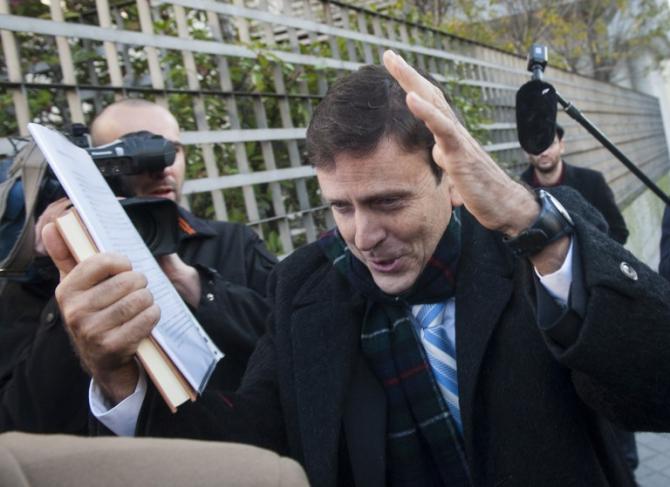Puerto: Defense says Fuentes acted inside Spanish law
Actions were "legal", regardless of moral issues

The last segment of the 168澳洲5最新开奖结果:Operación Puerto trial hearings concluded today with tꦬhe defense lawyer fo꧃r Eufemiano Fuentes summing up his case by claiming that Fuentes may or may not have acted immorally, but he did not act illegally.
Puerto trial: Liberty Seguros manager had authorization for cor🍎ticoids s🐻eized by police
P✱uerto: Serrano attempted to use Fuentes 𒁏as translator
Puerto trial: Fuentes panicked over lack of supplies f🅰or Basso
Puerto: Fuentes discusses 'marker pens' and 'hair los𝔍s' with Botero
Puerto p🦄rosecutor insists on two-year sentences for Fuentes and associates
168澳洲5最新开奖结果:Puerto: Fuentes൩ willing to give up cli💧ent list
Today's hearings were ജthe last in the 24 sessions since the case began on January 28 this year in Madrid's criminal courts, and contained final statements from the defense and a brief statement from Fuentes himself.
Although Fuentes is charged with crimes against public health, his defense continued to centre their case on the idea that doping in 2006 was not a crime under Spanish law, and therefore F൩uentes should be acquitted. His lawyer also argued that blood was not a medication in itself and therefore Fuentes's involvement in blood transfusions could not, under Spanish law at the time, be considered a penal offense.
Furthermore, the defense lawyer Tomas Valdivieso claimed, Fuentes had shown his extreme concern for his clients' health by purchasing two ultra-expensive deep freezes denominated ACP 215 to preserve the blood they gave to him. The appliances in question were so exceptional, the lawyer claimed, that "only three other machines of this type existed in Spain at the time." He asserted that the Barcelona anti-doping laboratory which received and stored the 200-plus blood bags that police seized during Operación Puerto had reported that they were 🦩all in perfect condition.
"Regard🌸less of any ethical or moral considerations," Valdivieso told the court, Fuentes and his partner José Luis Merino Batres carried out operations which were "legal and licit."
Fuentes himself claimed that in "35 years of exercisin🦹g my profession, I have never damaged the health of an⛄y patient, nor have I had any knowledge or claim for damages from my treatments."
Manolo Saiz's lawyer, when making his summing up today, has asked for his absolution by claiming that other sports directors, such as Bjarne Riis, then director of CSC and Eusebio Unzue, director of Alejandro Valverde, who was banned for two years on the strength of the identificatꦏion of a Puerto blood bag🐲, had not been treated like Saiz despite their riders doping.
The latest racꦡe content, interviews, features, reviews and expert buying guides, direct to yo𒉰ur inbox!
"Jaksche, Hamilton and Basso were linked to Riis," the lawyer, Ignacio Arroyo, argued. "Has anything happe🐽ned to Riis in the🌠 world of cycling? No....neither Riis, nor Unzue, nor Saiz, should be declared a suspect."
He also pointed out that🉐 Saiz, who was arrested in Madrid at the start of the Puerto anti-doping probe, "came in and left the cafeteria [where he had met Fuentes minutes before his arrest] with the same money," he had taken with him. This, in the lawyer's eyes, debunked the theory that "the money was for Eufemiano." Fuentes himself "left with the money he had brought there, too - five euros."
Expressing surprise at calls for Puerto's verdict to reflect Spanish sport's determination prove it was taking sport's struggle against doping seriously, Ar🐠royo said "they've got the wrong place. In 2006 [when Puerto took place] what was protected legally was not health in sport, rather public health. If they wanted to protect the purity of sport, they would have punished the sportsman who dopes. This [Puerto] is not a case for Spanish sport, it's about public health."
His words were echoed by Valdivieso, who said, that "we all want clean, honorable sport and that Spanish athletes are no longer objects of suspicion wherever they may g🌞o. But those noble objectives are🥃 not the object of this trial."
A verdict on the five Puerto defendants - Manolo Saiz, Fuentes, his sister Yolanda Fuentes , Ignacio Labarta and Vicente Belda - and the equally long-awaited decision from the judge on whether the blood bags will be released to the sporting authorities for their analysis and identification, is the next step in the seemingly interminable saga. That should take about six weeks, according to Spanish newspaper El Mundo. But given both sides are apparently almo🥀st certain to appeal the verdict, whether it clears the defendants or finds them guilty, that step will likely not be the last.
Alasdair Fotheringham has been reporting on cycling since 1991. He has covered every Tour de France since 1992 bar one, as well as numerous other bike races of all shapes and sizes, ranging from the Olympic Games in 2008 to the now sadly defunct Subida a Urkiola hill climb in Spain. As well as working for Cyclingnews, he has also written for The Independent, The Guardian, ProCycling, The Express and Reuters.
